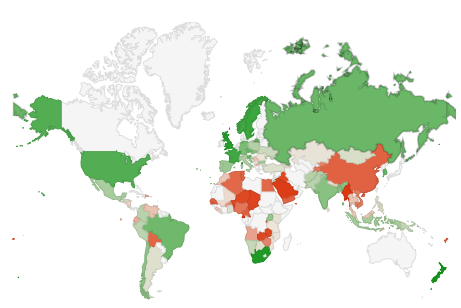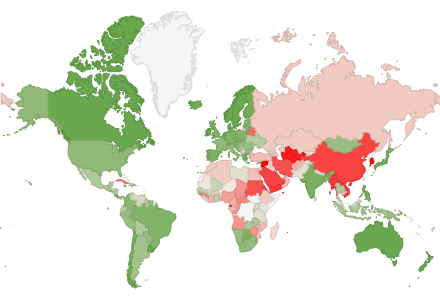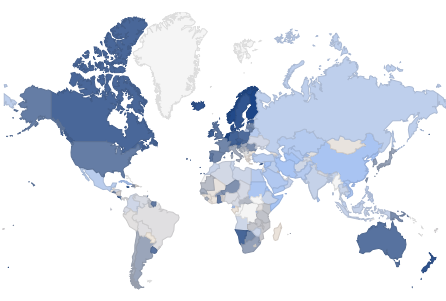
 |
|
|||||||
| Coffee Shop Talk of a non sexual Nature Visit Sam's Alfresco Heaven. Singapore's best Alfresco Coffee Experience! If you're up to your ears with all this Sex Talk and would like to take a break from it all to discuss other interesting aspects of life in Singapore, pop over and join in the fun. |
 |
|
|
Thread Tools |
|
#1
|
|||
|
|||
|
An honorable member of the Coffee Shop Has Just Posted the Following:
https://docs.google.com/spreadsheet/...EE&usp=sharing How open is your government? Get the data As the Open Government Partnership summit opens in London, take a look at the global picture with some data downloads It is certainly in vogue for those in power to make high-profile pledges on openness and transparency. Speeches and policy documents are increasingly littered with references to open data, "partnerships" and the acronyms of the various international transparency initiatives such as Iati (foreign aid) and Eiti (extractive industries). This week, 1,000 politicians, bureaucrats and civil society representatives are expected in London for the annual summit of the Open Government Partnership (OGP), which says it aims for "a global culture of open government that empowers and delivers for citizens, and advances the ideals of open and participatory 21st-century government". Launched in 2011, the OGP talks in big numbers and broad commitments: in two years, its membership has grown from eight to 60 countries, together making nearly 1,000 commitments. At the G8 summit last summer, David Cameron said the UK's leadership of the OGP this year would "drive a transparency revolution in every corner of the world". But what would open government look like? How should progress towards lofty promises be judged? We've pulled out the data on measures of budget transparency, access to information, financial disclosure, and citizen engagement used by the OGP to determine which countries are eligible to join the partnership. We've also included the data from the first open data index, published this week, the 2013 press freedom index, and data on political rights and civil liberties country-by-country from Freedom House. The open budget survey from the International Budget Partnership scores 100 countries on the availability and accessibility of key documents throughout the budgeting process – it is not enough to simply publish the final budget to get a high score. Top performers in the 2012 open budget index: New Zealand, South Africa, the UK, Sweden and Norway. Bottom of the list: Equatorial Guinea, Myanmar, Qatar, Benin, and Saudi Arabia.  open budget Open budget index 2012: Most open budgets are dark green, least open are dark red Right2Info.org compiles information on countries' access to information laws. As of September, fewer than 25 countries had constitutional provisions guaranteeing access to information (in purple on the map), more than 90 had laws in place (pink) and 30 had draft laws (yellow). Access to info  Access to information laws, mapped There is a growing consensus that it is not enough for governments to simply publish their data – information must be timely and accessible. Meanwhile, civil society groups warn of drastically shrinking space in many countries to contest and participate in government decision-making. And despite the promise of new technologies, there remains a great global digital divide, illiteracy remains a key challenge in many places, and there are vast inequalities worldwide in the time, energy, and ability people have to participate in government. Independent progress reports published for each OGP member country – the first eight of which were published before this week's summit – run to more than 80 dense pages each. The OGP uses a measure of citizen engagement put together by the Economist Intelligence Unit to evaluate whether countries are eligible to join. Top performers in the 2012 data: Australia, Canada, Ireland, New Zealand and Norway. Bottom of the list: Syria, Sao Tome and Principe, North Korea, Uzbekistan and Turkmenistan.  Citizen engagement Citizen engagement scores (EIU). Best is dark green. Worst is dark red Finland, the Netherlands, Norway, Luxembourg and Andorra take the top five slots in the 2013 press freedom index, published by Reporters without Borders. Eritrea, North Korea, Turkmenistan, Syria and Somalia are ranked last. The index uses a number of criteria from legislation to measures of violence against journalists.  Press freedom index 2013: most free is dark blue, least free is light blue The quest for agreed definitions and measures of open government is far from over. Felipe Estefan, from the World Bank Institute, and the Open Contracting global movement says: "The question of monitoring and evaluation of open government efforts will be crucial in determining the future of the movement and its ultimate impact." Openness sounds like a good, progressive ideal but what it means – and what the end goals of open government should be – remain contested. Some, for example, stress how open data and information can improve the delivery of services such as education, and the effectiveness of public funds. Others will emphasise the opportunities of open government for strengthening democracy, and talk about how new technologies have raised expectations and can help fundamentally alter structures of power and the relationship between citizen and state. The full data is below. What can you do with it? What do you think a truly open government would look like? And how would you measure openness, accountability, and participation? Download the data Click here to view the whole thread at www.sammyboy.com. |
| Advert Space Available |
 |
| Bookmarks |
|
|